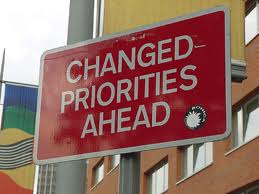This post, written by me, was originally posted on Fiscal Phoenix. The content is reposted with permission.
My (former) workplace has a very lax dress code. It started a couple of winters ago when the weather was really bad. Our cabinet secretary relaxed the business casual dress to code to allow us to wear jeans every day (since no one really wanted to ruin their nice clothes in the snow and slush). She extended it indefinitely and here we are, over a year later and I get to wear jeans to work all the time. It’s not too bad considering wearing jeans saves me a ton of money on a work wardrobe.
There are some rules. No flip flops, low cut shirts, shorts or tank tops. If we are attending a meeting or have to be in court, we must wear business clothes (this is fine for me as business clothes are usually a pair of dress pants and a button down shirt). I don’t mind the rules because overall, I’m happy with the dress code and I’m not going to do anything to mess it up.
This is the only job I’ve had where the person in charge allows for such casual attire every day of the week. All of my other jobs required business casual Monday-Thursday, with dress down Fridays. It’s dress down Fridays that we’re going to talk about now.
You know that episode of The Office where Dunder Mifflin institutes casual Friday and what the workers show up in is…less than acceptable? I’ve seen similar around my various workplaces and it frustrates me to no end. Not so much because I’m conservative but because there are unspoken rules about what is and what is not acceptable attire in the workplace. For instance:
- Pajamas. Are never, ever acceptable to wear to work. Unless you work from home, in which case pajamas are probably your uniform. But if you work in an office, around other people, have the courtesy to get dressed. Putting on a pair of jeans and a t-shirt is not hard work. Coming to work in your pajamas shows a lack of respect for the workplace and is definitely a way to get yourself into some hot water.
- Sweats. There are a good number of women I’ve worked who dress to the nines Monday-Thursday and then show up on Fridays in what I would wear to clean my house. Dirty, wrinkled sweats, stained shirts from various vacations spots they’ve been to, and grimy sneakers. Believe me, I don’t begrudge anyone her comfort. But if you’re going to wear sweats and t-shirts to work, make sure they’re clean and presentable.
- Mismatched clothes. Remember Punky Brewster? How she never matched? Well, believe it or not, there are people—adults—that come to work dressed like that. I’ll never forget the woman who came to work in a tie-dyed shirt, olive colored sweats, athletic socks and opened toed sandals. It was a disaster and completely unprofessional. Dressing like this is not a good way to get people to take you seriously.
- Jeans or shirts that are too tight. You know those people I’m talking about. The jeans that show a little too much or shirts that are way too revealing. Clothes that are fine if you’re in a bar or at home but show way too much for the office. Not only can this be deemed inappropriate by your co-workers and supervisors, you have to take note of the clients’ response as well. I worked with a woman who dressed like this daily and our clients were teenage boys. This had an…influence on their behavior when she was around. It got so bad our boss sent around a memo revising the dress code and she was reprimanded for her clothes. That’s not really a mark you want.
We don’t like to think that how we dress at work has an influence on how we’re perceived, but it definitely does. And how you dress on casual Friday is just as important as the rest of the week.




